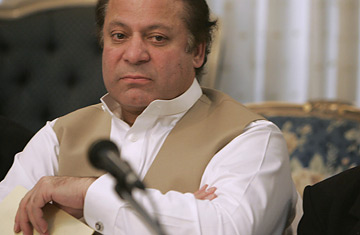
Former Pakistani Prime Minister Nawaz Sharif
Like the teenager who thought he was too cool to go to the party until he realized he was the only one left out, former Pakistani Prime Minister Nawaz Sharif announced Sunday that his Pakistan Muslim League (Nawaz) Party would contest parliamentary elections slated for January 8. In fact, like that metaphorical teenager, he may also have realized that he would have to participate in order to preserve his own cool clique.
Sharif, who had long held that the elections are illegitimate and should be boycotted, defended his decision on Dawn News television today, saying that after failing to convince fellow opposition leader and former Prime Minister Benazir Bhutto's party and a leading religious party to join him, the boycott would be ineffectual. "If any boycott is to take place it must be unanimous, any partial boycott would be disastrous for the opposition," he said.
That may be the case for the opposition as a whole. But it is also true for the part of the oppostion he leads. Sharif, who has been disqualified from running himself due to criminal charges related to Musharraf's 1999 coup, risked the defection of key members of his party if he did not allow it to join the elections. "The [party] had a lot of heavyweights that stood a good chance of winning key seats if they contested," says Ayesha Tammy Haq, a prominent political talk show host. "If Sharif called for a boycott, they would have defected. The party would have been in tatters."
Sharif first suggested that he would boycott the elections nearly two weeks ago, the day President Pervez Musharraf was sworn in for his second term as President. It was a protest against Musharraf's state of emergency, which Sharif said would limit campaigning and make the elections unfair. Even though Musharraf announced on the same day that the emergency would be lifted on December 16, Sharif maintained that without the restoration of the Supreme Court, which the President dismissed when he suspended the constitution and declared the state of emergency, elections would legitimize Musharraf's actions.
But political observers said that without unified support from the opposition, a boycott by Sharif's party would have been meaningless. On Sunday, Sharif acceded to that reality. He said that he has decided to fight the system from within: "We came to the realization that we must participate in the elections to block Mr. Musharraf's unconstitutional actions."
At first glance this seems to be a victory for Musharraf, who can now claim that January's elections are legitimized by nearly full party participation (several smaller parties, including that of Imran Khan, another politician with premier ambitions, have not yet decided if they will contest). But now Musharraf's smaller party, which split off from the Muslim League when Musharraf overthrew Sharif in 1999's bloodless coup, faces serious competition from both the Bhutto's People's Party of Pakistan and Sharif's party, which have wide national support.
Musharraf cannot afford less than a landslide for his party; otherwise he risks facing an opposition in parliament that could invalidate his extra-constitutional declaration of emergency rule. At the very least a two-thirds majority could unseat him. A two-thirds majority in parliament could also call for the reinstatement of the original Supreme Court, which Sharif says is his party's primary goal. That reconstituted high court could then rule that Musharraf contravened the constitution by dismissing the judges in the first place and declaring emergency. And, what is most worrisome for Musharraf, working outside the constitution in Pakistani law can be considered treason.
Given what is at stake for Musharraf, few in Pakistan believe that the upcoming elections will be free and fair. But even if they are, talk-show host Haq has little faith that the parties would be able to unite to oust Musharraf. "No one will have the majority to be able to do this," she says. "It calls for tremendous amounts of integrity and political will, which I see lacking in all political parties." But with Sharif now in it, the Pakistani political drama is making for a challenging game of chess for Musharraf.
